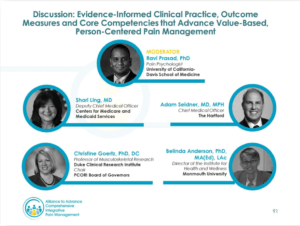Director of the Institute for Health and Wellness Belinda Anderson, Ph.D., was one of several experts invited to present at the Alliance to Advance Comprehensive Integrative Pain Management (AACIPM) virtual symposium that took place on May 13-14. The focus of the symposium was innovation in person-centered pain management.
Anderson is a federally-funded researcher investigating non-pharmacologic approaches to pain management. She and colleagues from Albert Einstein College of Medicine and Mount Sinai Medical Center have been conducting clinical trials that have demonstrated the effectiveness of acupuncture and yoga therapy for treating pain. Their research is undertaken in community-based clinics, which treat underserved minority patients who are disproportionately affected by the opioid crisis.
According to Anderson, major healthcare issues in the U.S.—like the opioid crisis—have been overshadowed due to the current COVID-19 pandemic. The misuse of and addiction to opioids has resulted in over 400,000 deaths in the U.S. since the turn of the century.
“Today, 50 million Americans suffer from chronic pain, nearly half of whom are living with pain that significantly impairs their ability to go about their daily lives,” Anderson said. “Pain treatment in the U.S. costs between $560 billion and $635 billion annually, which is greater than the combined cost of treatment for heart disease, diabetes, and cancer. When the pandemic is over, we will still be facing this pain crisis, which will have only worsened as a result of the pandemic.”
The two-day symposium provided a sampling of the nation’s leading examples of innovation and progress that supports advancing a cultural shift to evidence-informed, whole-person-oriented pain management featuring multi-disciplinary, team-based approaches. Anderson spoke about the recent determination from Medicare to cover acupuncture for low back pain, and its implications for education of healthcare providers and implementation within hospitals and community clinics.
The AACIPM is a multi-stakeholder collaborative that is comprised of public and private insurers, government agencies, patient and caregiver advocates, researchers, purchasers of healthcare, policy experts, people living with pain, and the full spectrum of healthcare providers involved in the delivery of comprehensive integrative pain management. AACIPM’s focus is advancing a person-centered, coordinated approach to pain management that is affordable, sustainable, informed by evidence, and connected to quality outcomes.
More details about the symposium and the AACIPM are available online.

